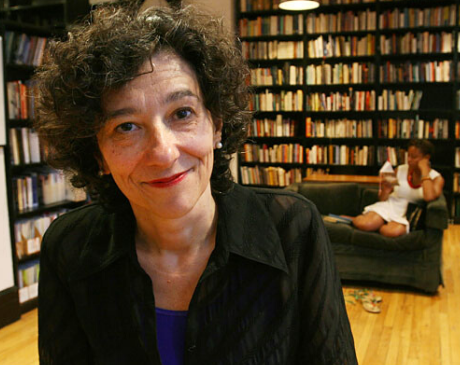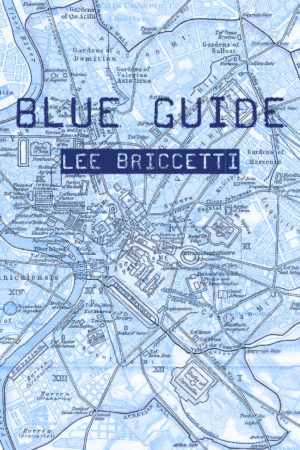In Their Own Words
Lee Briccetti on “Sky Notes / Sky Sonnet (1)”

Sky Notes / Sky Sonnet (1)
, here I am accustomed to walk for sky views and effects, either morning or sundown
, the sky, with white silver swirls like locks of toss'd hair, spreading
, day-close, an incomparable sunset shooting in molten sapphire and gold
, hast Thou, pellucid, in Thy azure depths, medicine for a case like mine?
—Walt Whitman
, clouds gilt-gold, long-moment's spaciousness
, moment, in which I hope
, unwell, his eyelids the color of sumptuous gold summer
, voices from the street: girls joke bravely
, time has the sound of newspapers' ignited kindling
, slap of a prow in waves
, until nature halts (a little)
, we talk!
, spirit-chamber lifting
, no omen, just listening in time's compression
, our breezy darkness, our sleep-snorts and dream-running
, nurse's smile surprises up past wet gum line
, our clasp and holding on
, though I have food and money for escape
From Blue Guide (Four Way Books, 2018). All rights reserved. Reprinted with the permission of the author.
On "Sky Notes / Sky Sonnet (1)"
The volta of the Elizabethan sonnet is one of my favorite literary and intellectual inventions. Because it readjusts the rhetoric of the poem, sometimes even pulling arguments inside out like a sleeve, it communicates that a changed position is possible. Each line of what I call my broken sonnets begins with a comma, announcing a new direction, or shifting view. The hope is to keep the poem dependent on the left-hand margin but destabilized and turning. Like a whirling dervish, the movement of each broken sonnet is contemplative.
While punctuation is always about emphasis and time, I use the commas in my broken sonnets—commas, with their brief inhalation and rising tone—to signal a cadence of mental utterance that is both episodic and additive, turning the voice around in its little delays.
The series started by accident as I was studying the thrilling changes in tone and shifts in rhetoric communicated by Dickinson's dashes, which are so visually directional, like a finger pointing forward—next—but—then. I also began to notice her compound-pauses, the combination of a comma and dash ",—" at the end of certain arguments, which seem to empty a poem, at its finish, into time and the white space of the page.
I have many lists of Dickinson phrases vertically stacked in my journals. These lists, read independently from their original contexts, gave me the idea to begin each line of a poem just slightly out of sequence, with a little delay in fluency, a little slant. What follows below is an excerpt from one of my ED lists. All of these are last lines. The italics in the last two lines are my own, meant to emphasize the weight on the last word. The first adorable comma is my own too, a typographic mistake I fell in love with. Take a look:
,'Twas lighter—to be Blind—
Illuminate—or Seal—
Till all the World is ajar—
As those first furnished, said—
Is all that's left them, now—
(from ED poems 761, 777, 931, 933, 935; Johnson, Little Brown, 1960 edition)
The additive, halting structure of my ED lists helped me consider how to break apart the rhetorically closed sonnets I had been writing. In my broken sonnets, a readjustment takes place at the beginning of each line. This ultimately seemed to be the right register in which to speak about illness, loss, the body as it breaks. To my ear, it was also the sound of the mind trilling and finding its way repeatedly into a new place.
Another note: the Whitman quotes of the epigraph are from Specimen Days, a book I treasure for the intimacy of the poet's voice and dazzling, focused observations of the natural world. Again, the context of each line is removed with an initial comma functioning as tiny typographic hook into the wisp of fragment.
These broken sonnets stitch their way through Blue Guide, my new collection concerned with place and how unreliable our sense of place can be. When I started the broken sonnets, I was also studying clouds and constellations—getting up in the middle of the night to look up with sky guides and phone apps, etc.—unnerved and enchanted all over again by the awareness that everything is moving through space and time—our planet, our sun circumnavigating the galaxy every 225,000 years. Everything turning. This kind of whirling felt like a new way for me to consider dependencies unhinged, love and illness, the breaking inside thinking.



